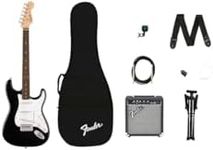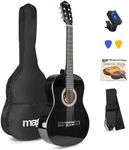Buying Guide for the Best Guitar For Beginners
Choosing the right guitar as a beginner is crucial to your learning experience and enjoyment. The right guitar will not only be comfortable to play but will also inspire you to practice more. When selecting a guitar, consider factors such as the type of music you want to play, your physical comfort, and the sound you prefer. It's important to try out different guitars if possible, to see which one feels right for you. Remember, the best guitar for you is one that you feel excited to pick up and play.Type of GuitarGuitars come in various types, including acoustic, electric, and classical. The type of guitar you choose will depend on the style of music you want to play. Acoustic guitars are great for folk, country, and singer-songwriter styles, while electric guitars are suited for rock, blues, and jazz. Classical guitars, with nylon strings, are ideal for classical and flamenco music. As a beginner, consider what music excites you the most and choose a guitar type that aligns with that interest.
Size and ShapeGuitars come in different sizes and shapes, which can affect comfort and playability. Full-size guitars are standard, but there are also 3/4 and 1/2 size guitars for younger players or those with smaller hands. The shape of the guitar body, such as dreadnought, concert, or parlor, can influence the sound and how comfortable it is to hold. Try different sizes and shapes to see which feels most comfortable for you, especially if you plan to play for extended periods.
Neck Width and Scale LengthThe neck width and scale length of a guitar can greatly affect playability. A wider neck might be more challenging for beginners with smaller hands, while a narrower neck can be easier to manage. Scale length, the distance from the nut to the bridge, affects string tension and spacing. Shorter scale lengths can be easier for beginners to play, as they require less finger stretch. Consider your hand size and comfort when choosing neck width and scale length.
String TypeGuitars can have either steel or nylon strings. Steel strings are common on acoustic and electric guitars and produce a bright, loud sound, but they can be tougher on the fingers. Nylon strings, found on classical guitars, are softer and easier on the fingers, making them a good choice for beginners. Think about the sound you prefer and your finger comfort when deciding on string type.
Sound QualityThe sound quality of a guitar is subjective and can vary greatly between models. It's important to choose a guitar that sounds good to you, as this will encourage you to play more. Listen for a balanced tone that suits the style of music you want to play. If possible, play a few chords or notes to see how the guitar resonates and if you like the sound it produces.
Build QualityThe build quality of a guitar affects its durability and sound. Look for a guitar with solid construction, good materials, and a finish that appeals to you. Check for any visible defects or issues with the neck, body, and hardware. A well-built guitar will not only last longer but will also provide a better playing experience. Consider reading reviews or asking for recommendations to ensure you're choosing a reliable instrument.

















